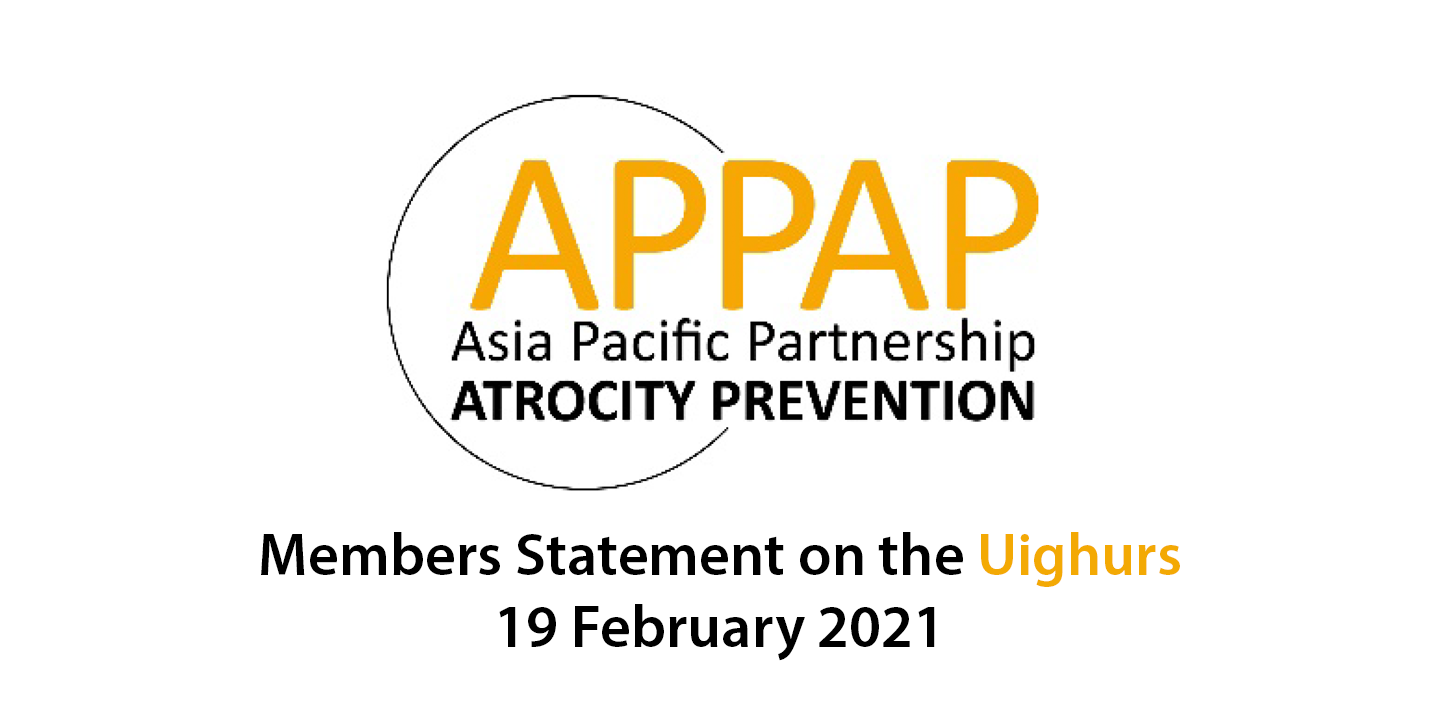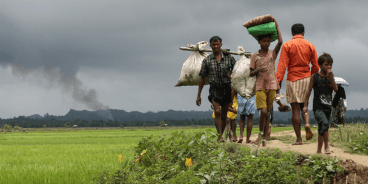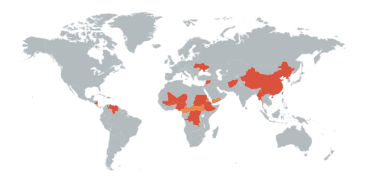

The Asia Pacific Partnership for Atrocity Prevention (APPAP) Members Statement on the Uighurs
The Asia Pacific Partnership for Atrocity Prevention (APPAP) is an alliance of organisations working to promote human rights and support atrocity prevention in the region.
APPAP warns that crimes against humanity are being perpetrated against the Uighur population in Xinjiang, China, including widespread and systematic sexual and gender-based violence (SGBV).
These crimes may also amount to genocide.
Allegations of SGBV in so-called “re-education” camps where Uighurs are detained have been brought to light in a BBC investigation which collated survivor and eyewitness testimonies. Survivors have spoken out about experiences of repeated gang rapes, sexual torture involving electric shocks, forced nudity, and of being forced to participate in a “system of organised rape” by undressing others in preparation for abuse. This evidence confirms previous reports of forced sterilisation.
Survivors say they were subjected to medical examinations and medication regimes, and injections to inhibit the ability to reproduce.
The widespread or systematic use of sexual and gender based violence is a crime against humanity. When used with intent to destroy a group, SGBV falls within the definition of genocide under the Genocide Convention, by causing serious bodily or mental harm, inflicting conditions to bring about the group’s destruction; and imposing measures to prevent births within the group. The Akayesu decision of the International Criminal Tribunal on Rwanda recognised sexual violence as a genocidal strategy, and much evidence of its widespread use to disrupt the continuity of a targeted community has been found in recent cases against the Yazidis in Iraq and Rohingya Muslims in Myanmar.
SGBV can cause long-term physical harm to survivors, as well as psychological trauma and ongoing stigma that can rupture women’s relationships with their family and community, thereby attacking the individual and the group simultaneously.
Further, preventing births within the group, such as by separating men and women, or imposing forced contraception, abortion or sterilisation, is recognised as a genocidal act under the Convention. Although Chinese officials deny human rights violations or atrocity crimes, some statements by authorities have indicated an intention to reduce the number of births within the Uighur community. For example, the Chinese Embassy in the US posted on social media a claim that Uighur women were being “emancipated” by the re-education process and were “no longer baby- making machines”.
Previous reports have found that China’s tactics of persecution, torture, forced sterilisation, forced assimilation and other serious injuries to mental and physical health against the Uighur minority, constitute crimes against humanity. The increasing evidence of biological tools to prevent births within the group, and reports of widespread and systematic sexual violence against Uighur women, strongly indicate genocidal intent by the Chinese government. A legal opinion published in February 2021 also suggests that acts being carried out by China may amount to genocide.
China is failing its responsibility to protect its population from atrocity crimes. Action must be taken by the UN and global community to deter further atrocities in Xinjiang and hold authorities accountable for abuses already perpetrated.
APPAP condemns the policies and practices of the Chinese government against the Uighurs and calls on China to:
- immediately cease committing physical, sexual, biological and cultural abuses against the Uighur minority group, and to respect the human rights of all its population; and
- permit immediate and unfettered access to Xinjiang by the UN High Commissioner for Human Rights to ascertain the true extent of SGBV and other human rights violations occurring within the
APPAP calls on UN Member States to consider taking appropriate steps to uphold their commitment to the Responsibility to Protect by:
- supporting the establishment of an independent UN mechanism to investigate the situation in Xinjiang;
- formally recognising that China is committing atrocity crimes and imposing targeted sanctions on those overseeing this vast infrastructure of persecution.
Signatories:
Asia Pacific Centre for the Responsibility to Protect
ASEAN Parliamentarians for Human Rights
Asian Muslim Action Network Indonesia
ALTSEAN-Burma
ASPIRE Network
Belun Timor
Cambodian Institute for Cooperation and Peace
Center for International Law, Korea National Diplomatic Academy
Centre for Non-Traditional Security, Nanyang Technological University
Centre for Peace and Justice, BRAC University
Centre for Strategic and International Studies
Documentation Center of Cambodia
Department of Political Science, Ateneo de Manila University
Global Centre for the Responsibility to Protect
The Habibie Centre
Human Rights Working Group Indonesia
Humaniti Malaysia
Institute for Asia Human Community, Waseda University
Institute of Human Rights and Peace Studies, Mahidol University
Initiatives for International Dialogue
Institute for Peace and Democracy
The Peace Advocates for Truth, Healing and Justice
Research Initiatives Bangladesh
Women’s Peace Network
The Seagull: Human Rights, Peace and Development
Beyond Borders Malaysia
Related Content


Atrocity Alert No. 420: Myanmar (Burma), Syria and Forced Labor
